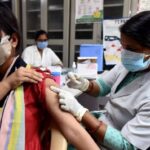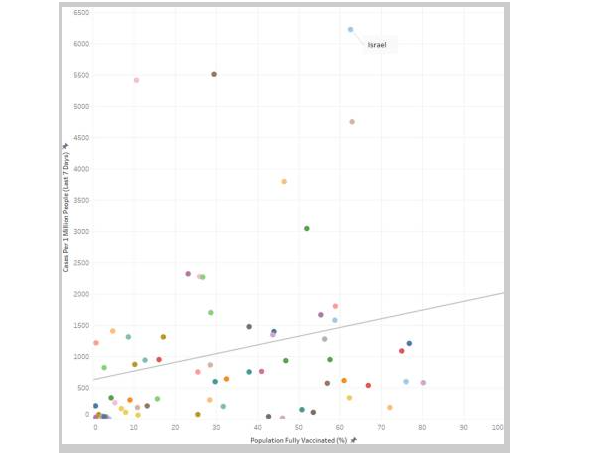Covid and vaccines: positive correlation, or no correlation, between the number of covid cases and the percentage vaccinated


Vaccines are currently the leading mitigation strategy for combating COVID-19 around the world, or so it is presented. It is often claimed that the spread of infections is linked to unvaccinated people or to areas with low vaccination rates. Yet the data is contradictory: Israel, which has been hailed for its rapid and high vaccination rates, has also seen a substantial resurgence in COVID-19 cases. So it is true or not that the higher the vaccination rate, the lower the infections.
Let's see an article that appeared in the scientific journal of the National cCnter for Microbiological Information that comes to study the correlation between the percentage of the vaccinated population and the number of Covid-19 cases.
We can already tell you that the study was large, involving 2947 US counties and 68 states, and the results were amazing:

At the US level, there appears to be no distinguishable relationship between the percentage of the population fully vaccinated and new cases of COVID-19 in the past 7 days. At the level of nation states, it is slightly different. Indeed, the interpolation line suggests a marginally positive association whereby countries with a higher percentage of fully vaccinated population have higher COVID-19 cases per 1 million people. Notably, Israel with over 60% of the population fully vaccinated had the highest COVID-19 cases per 1 million people in the past 7 days. The lack of a significant association between the percentage of the population fully vaccinated and new cases of COVID-19 is further exemplified, for example, by the comparison between Iceland and Portugal. Both countries have over 75% of their population fully vaccinated and have more COVID-19 cases per 1 million people than countries like Vietnam and South Africa which have around 10% of their population.
Therefore the high vaccination rate does not rule out a high number of infections. The writing ends by saying the following:
Relying on vaccination alone as a primary strategy to mitigate COVID-19 and its adverse consequences needs to be re-examined, especially considering the Delta variant (B.1.617.2) and the likelihood of future variants. Other pharmacological and non-pharmacological interventions may need to be implemented along with increasing vaccination rates. Such course-correction, particularly with regards to the political narrative, becomes crucial with the emerging scientific evidence on the effectiveness of vaccines in the real world.
In summary, while efforts should be made to encourage populations to get vaccinated, they should be done with humility and respect. Stigmatizing populations can do more harm than good. Importantly, other non-pharmacological prevention efforts (for example, the importance of basic public health hygiene with regards to maintaining a safe distance or hand washing, promoting more frequent and less expensive) need to be renewed in order to strike the balance between learning to live with COVID-19 in the same way we continue to live 100 years later with various seasonal alterations of the 1918 flu virus.
I don't think there is much to add. We need to rethink a bit all communication and the way to deal with covid-19. Above all you need to have humility and an open mind, the famous “Grano salis”. how much is there in Italy?

Thanks to our Telegram channel you can stay updated on the publication of new articles of Economic Scenarios.
The article Covid and vaccines: positive correlation, or no correlation, between the number of covid cases and the percentage vaccinated comes from ScenariEconomici.it .
This is a machine translation of a post published on Scenari Economici at the URL https://scenarieconomici.it/covid-e-vaccini-correlazione-positiva-o-nessuna-correlazione-fra-numero-di-casi-covid-e-percentuale-vaccinati/ on Fri, 05 Nov 2021 16:33:25 +0000.
